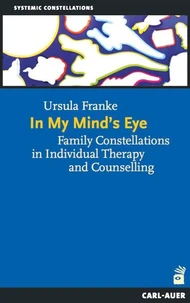The River Never Looks Back. Historical and Practical Foundations of Bert Hellinger´s Family Constellations
Par : , ,Formats :
Disponible dans votre compte client Decitre ou Furet du Nord dès validation de votre commande. Le format PDF est :
- Compatible avec une lecture sur My Vivlio (smartphone, tablette, ordinateur)
- Compatible avec une lecture sur liseuses Vivlio
- Pour les liseuses autres que Vivlio, vous devez utiliser le logiciel Adobe Digital Edition. Non compatible avec la lecture sur les liseuses Kindle, Remarkable et Sony
 , qui est-ce ?
, qui est-ce ?Notre partenaire de plateforme de lecture numérique où vous retrouverez l'ensemble de vos ebooks gratuitement
Pour en savoir plus sur nos ebooks, consultez notre aide en ligne ici
- Nombre de pages176
- FormatPDF
- ISBN978-3-8497-8078-4
- EAN9783849780784
- Date de parution01/01/2017
- Protection num.Digital Watermarking
- Taille3 Mo
- Infos supplémentairespdf
- ÉditeurCarl-Auer Verlag
Résumé
This is a book about the theory and practice of the method of systemic family constellation. Ursula Franke provides a well-grounded historical overview of the precursors to family constellations. In addition, she presents and defines the central terminology of these methods. The author presents a model that attempts to explain the efficacy of constellations. The empirical section allows the reader to take a look at the procedure that is used in the process of a constellation.
In addition, the possibilities for and limitations of using constellations in individual therapy are discussed. The study presented in "The River never looks back" focuses on therapy with anxiety patients. The results of the study can be used in regular psychotherapeutic practices, and is thus is helpful for all therapists who work with constellations.
In addition, the possibilities for and limitations of using constellations in individual therapy are discussed. The study presented in "The River never looks back" focuses on therapy with anxiety patients. The results of the study can be used in regular psychotherapeutic practices, and is thus is helpful for all therapists who work with constellations.
This is a book about the theory and practice of the method of systemic family constellation. Ursula Franke provides a well-grounded historical overview of the precursors to family constellations. In addition, she presents and defines the central terminology of these methods. The author presents a model that attempts to explain the efficacy of constellations. The empirical section allows the reader to take a look at the procedure that is used in the process of a constellation.
In addition, the possibilities for and limitations of using constellations in individual therapy are discussed. The study presented in "The River never looks back" focuses on therapy with anxiety patients. The results of the study can be used in regular psychotherapeutic practices, and is thus is helpful for all therapists who work with constellations.
In addition, the possibilities for and limitations of using constellations in individual therapy are discussed. The study presented in "The River never looks back" focuses on therapy with anxiety patients. The results of the study can be used in regular psychotherapeutic practices, and is thus is helpful for all therapists who work with constellations.







